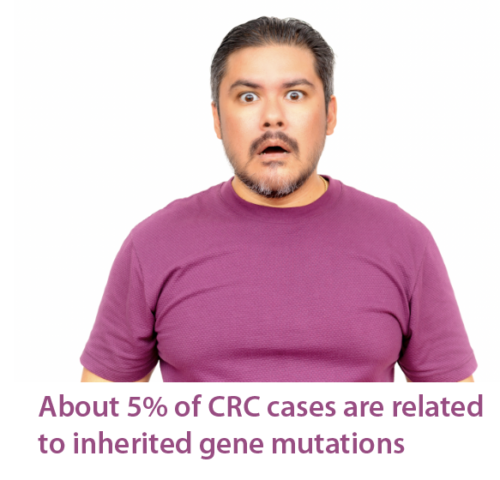1 in 4
people diagnosed with
Colon Cancer have
a family history of Colon Cancer
10%
of Colon Cancer Cases
are in people under 50
Lifestyle
and diet can also increase
your risk
Know your family history.
People with a family history of cancer should get screened starting at age of 40 or 10 years before the youngest case in your immediate family, whichever is earlier.
A family history of colorectal cancer means either:
At least one immediate family member (parent, brother, sister, child) was diagnosed with CRC under the age of 60.
Or multiple second-degree relatives (grandparents, aunts, uncles, cousins, etc.) were diagnosed with CRC.
The risk increases if any of those relatives were diagnosed before the age of 45.


Some of these mutations can greatly increase a person’s lifetime risk, including:
– Lynch Syndrome
– FAP
– Muir-Torre Syndrome
– Peutz-Jeghers Syndrome
– Li-Fraumeni Syndrome
– MUTYH-associated polyposis syndrome (MAP syndrome)
– BRCA1 and BRCA2 mutations most commonly associated with breast cancer
Lifestyle factors that can lead to higher risk include:
Depending on your ethnicity, you may also have a heightened risk. Studies have shown that Africa Americans are 15% more likely than other ethnicities to develop CRC. Latino men have also been shown to have high rates of late-stage CRC.
CRC: On the Rise in People Under 50.
It’s important to know that colon cancer cases including cancers of the rectum are dramatically increasing in younger adults. In fact, over the last three decades, young onset CRC has increased by 51% including among women. This is one of the main reason why the U.S. Preventive Service Task lowered the recommended age for colorectal cancer screening to 45 for average risk adults.
For people at higher risk screening should begin earlier

Lifestyle factors that can lead to higher risk include:
– Being overweight
– Alcohol consumption
– Tobacco use
– Lack of regular physical activity
– A diet low in fruit and vegetables
– A low-fiber and high-fat diet
– A diet high in processed meats
Other factors that a person may be less able to control include:
– Inflammatory Bowel Disease (IBD)
– Diabetes (Type 2)
– Current or prior infections of the bacteria H.Pylori
All adults should be educated about their risk for CRC
and begin a screening program as needed
